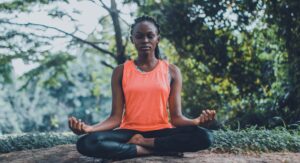Anxiety is defined by the American Psychological Association (APA) as “an emotion characterized by feelings of tension, worried thoughts, and physical changes such as increased blood pressure.”
Almost all of us can relate to having experienced anxiety… perhaps even within the last 24 hours.
Anxiety is pretty common, especially in our crazy, tuned-in (but not really), smartphone-carrying, ultra-competitive society.
To be clear, experiencing occasional anxiety is completely normal. We all get overwhelmed from time to time, with life’s demands and stressors being almost daily occurrences.
Here are 7 practical and effective ways to deal with anxiety in your life:
“People tend to dwell on the negative rather than the positive.” As a result, the mind becomes obsessed with negative things, such as judgments, guilt, and anxiety caused by future thoughts, and so on.” – Eckhart Tolle, “The Power of Now” author
1. Remember that anxiety causes impulsive behavior
Our brain works in mysterious ways at times. Actually, do that the majority of the time. We are all prone to impulsive behavior from time to time…and it is automatic.
Our brains have a “fight or flight” mechanism that has been attributed to evolutionary changes in the brain that control how the body functions in an emergency. Here’s a brilliant analogy discovered while searching the web.
2. Remind yourself that your anxious feelings are only temporary
Anxiety, like nearly everything else, comes and goes. The reason for this is simple: our bodies, minds, and life experiences are constantly changing. As a result, our brains must constantly change and adapt.
Uncertainty is without a doubt the most powerful and common precursor of anxiety. When we feel out of control in any way, we almost always experience anxiety. When you’re feeling overwhelmed or out of control, remember that these feelings are only temporary. “This, too, shall pass…”
What happens next? Well, it’s starting to fade.
3. Get Activity

Exercise is most likely the most effective antidote to anxiety. It doesn’t matter what kind of exercise you do—biking, hiking, swimming, running, shooting hoops as long as your heart is pumping at a good rate. Simply put, exercise makes us happier. Interestingly, any form of exercise has been shown to be as effective (if not more effective) than antidepressants.
Not only does exercise improve your mood, but being outside in the fresh air and sunshine can also help.
4. Take care of yourself
When we are not feeling well, our natural response is to rest; perhaps even make a hot cup of tea and try to sleep. This reaction is almost automatic…we’ve been “trained” to do it when we’re not feeling well.
We don’t feel well when we are anxious. The only difference is that we must be more proactive in how we treat ourselves because, unlike most physical illnesses, we have more control over how we respond.
So, be proactive by meditating, reading something inspiring, resting, going outside… Whatever brings you joy and peace, do it. Be your own best friend.
5. Pay attention to your Breathing

We may be limited in how we deal with our anxious feelings depending on where and when they occur. Bringing your attention to your breath while at work or in a crowded public place is a great way to help relieve anxiety.
For a few moments, concentrate on the breath by placing one hand on the abdomen and the other on the chest and attempting to make the abdominal area move more. The reason for this is that when we are anxious, we tend to breathe more shallowly (with more chest movement)
Proper oxygen delivered to the brain can immediately restore your sense of reason, allowing your anxiety to decrease.
6. Learn about the human Brain
This serves as another reminder that we are not our brains. This fact cannot be overstated, but it is frequently overlooked or unknown by many.
Neuroscientists, psychologists, and psychiatrists all agree. The emotional, primitive parts of our brain (the ‘amygdala’) are responsible for the generation and processing of primal emotions (fear, worry), while the logical parts – the frontal lobes and cortex – are educated, sophisticated, and reasoning.
In layman’s terms, we have both the local community theatre drama queen and the distinguished, intellectual Harvard professor telling us what to do.
7. Divert your Attention
We may have the most complex and advanced brains in the animal kingdom, but that doesn’t mean we aren’t susceptible to a tasty distraction now and then.
When anxiety is high, we want to get as far away from ourselves as possible. It doesn’t matter how it’s done – a movie, game, book, magazine, puzzle, etc. – as long as it diverts the mind’s attention away from the task at hand.
- Can you share other tips that can help our users in Anxiety Management ?
If you enjoyed this blog post, share it with your friends!
